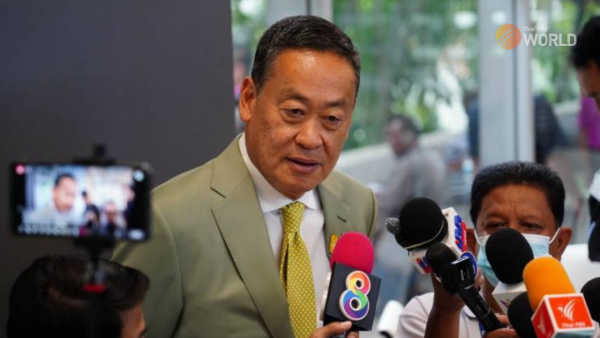Can Thailand afford to raise minimum wage to 600 baht?

The Pheu Thai Party has made a big election promise: if it becomes the ruling party next year, Thailand’s minimum daily wage will rise to 600 baht by 2027. The election pledge has divided opinion and sparked a heated debate on whether this promise is reasonable or will open a can of worms.
“Our policy to raise the daily minimum wage to 600 baht will be implemented as the Thai economy grows,” said Paetongtarn Shinawatra, in her capacity as chair of Pheu Thai’s committee on public participation and innovation.
Paetongtarn, the youngest daughter of fugitive former PM Thaksin Shinawatra, also heads the Pheu Thai Family.
“We are going to drive the Thai economy with a growth rate forecast at 5% per year,” she continued. “Our wage hike will benefit both employees and employers.”
Another populist policy?
Prof Lae Dilokvidhyarat of Chulalongkorn University’s Faculty of Economics said that in a democracy it was natural for political parties to present popular policies like huge wage hikes.
“Populism is perfectly normal. Democracy is about populism. If people do not like your ideas, they will not vote for you,” he said. “Political parties need to formulate policies that will appeal to voters and implement them. If they can’t deliver, they will not get votes next time”.
The Pheu Thai Party, a reincarnation of the hugely popular Thai Rak Thai Party that was dissolved in the wake of the 2006 coup, has already honored one election pledge to hike the minimum wage. In 2012, separate minimum wage levels across the country – from 144 baht in Phayao to 215 baht in Bangkok – were lifted to a flat rate of 300 baht under the Pheu Thai-led government.
By contrast, the ruling Palang Pracharath Party has so far failed to implement its 2019 election pledge to raise the daily minimum wage to 425 baht a day. General Prayut Chan-o-cha, who became prime minister three years ago after being nominated by Palang Pracharath, has never mentioned the 425-baht-wage policy.
Winning workers’ hearts
Thanaporn Wichan of the Labor Network for People’s Rights said Pheu Thai’s 600-baht wage policy had impressed laborers because it resonated with their needs. In her view, the current daily minimum wage is lower than it should be.
“Under this government, the wage has risen by just 21 baht. That amount will buy just three packs of instant noodles,” Thanaporn said.
The current minimum wage in Thailand ranges between 328 and 354 baht depending on location. Provinces with higher living expenses such as Bangkok use a higher minimum wage.
Pattama Ngarmpang, a 36-year-old cleaner in Bangkok, earns 360 baht a day – just above the minimum. However, since each month contains an average of 22 workdays, her monthly income hovers at around just 7,920 baht. After social-security contributions are deducted, she only has 7,400 baht to scrape by.
“My room rent is 2,500 baht. My utility bills are about 1,000 baht. So, without any overtime, I am in trouble,” she said.
When Pattama does not have enough money to pay the bills at the end of the month, she turns to a loan shark. She now owes nearly 50,000 baht to illegal moneylenders and needs to pay 10,000 baht in back rent to her landlord.
“I am happy if political parties have policies to raise wages,” she said hopefully. “You know, living expenses have been rising.”
Outcry from employers, government
Labor Minister Suchart Chomklin has launched an online war of words against Pheu Thai’s 600-baht-wage policy.
“Don’t blabber about it just for fun. Think about the economic calamity your policy will bring too,” he wrote recently.
“Your action amounts to nothing less than hurling a time bomb at business owners. You are wooing votes by passing burdens to the private sector. This is not right. This will scare foreign investors away too,” the minister raged.
Thai Chamber of Commerce chairman Sanan Angubolkul complained the big wage hike could see the collapse of many small and medium enterprises (SMEs) and the relocation of big businesses’ manufacturing bases to other countries.
“If you ask for a nearly 70-per-cent wage hike, the business sector may not be able to adjust,” he said.
ECONTHAI vice president Tanit Sorat also attacked Pheu Thai’s pledge, saying it represented blatant political inference in the tripartite committee’s decision on how much the daily minimum wage should be.
“I agree that wages should rise significantly, but any hike should come from discussions among the committee members,” he said.
Chaired by the Labor Ministry permanent secretary, the tripartite committee comprises four government representatives, and five representatives each from employees’ and employers’ camps.
Once the committee makes its decision, the permanent secretary presents it to the Cabinet to acknowledge.
“While the government pays for debt cancellation or economic-stimulus policies, it does not pay for minimum wage hikes. Employers must pay these,” Tanit said. “If you say that higher wages will come with upgraded business operations and labor skills, I must tell you that this is easier said than done.”
He added that based on his experience in garment business, he had witnessed how difficult it is to achieve business growth through upskilling or reskilling.
“I come from the SME sector. It’s not easy for your business to expand given a lack of know-how, capital, and markets,” he said.
Wage for decent living standards
Economics professor Lae said that when fixing its minimum wage, a country must focus on more than just demand and supply. Wages, after all, determine quality of life for earners.
“Wages are a means of life security. When you work, your pay should be enough for you to survive. By law, your pay should be enough to support yourself and at least one of your family members too,” the academic pointed out.
He added that in the face of soaring living expenses, Thailand’s minimum wage earners are struggling with an endless cycle of debt.
Minimum wages across ASEAN
Brunei has the highest minimum daily wage in ASEAN at about 1,754 baht. Singapore comes second, setting the minimum at 1,430 baht a day. Indonesia offers 540 baht and Malaysia 455 baht. Next come the Philippines (349 baht), Vietnam (323 baht), Cambodia (268 baht), Laos (135 baht) and Myanmar (90 baht).
By Thai PBS World






